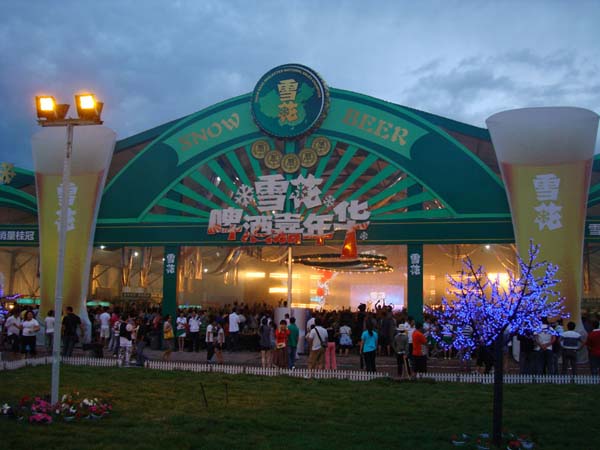The Jewish Tradition in China
"Harbin is a modern city that has a deep tradition of music."
"We want to rejuvenate this tradition so we can bring it to the next level."
Liu Shifa, Harbin city deputy mayor
"[Harbin city officials have a goal] a vision of building a cultural bridge with Israel."
"So I came as a catalyst between the two sides."
Zubin Mehta, music director, Israel Philharmonic Orchestra
"The Jewish community made huge contributions to the establishment of Harbin's musical tradition."
Miao Di, director, Harbin Museum of Music
"Every city in China is trying to find its niche, and it's clear that Harbin discovered theirs early."
Jindong Cai, professor, musical conductor, Stanford University, California
| Main Synagogue in Harbin; 105 years old, refurbished by the Chinese government.. (photo credit:JEWISH COMMUNITITES OF CHINA) |
A strange situation, given the reality that the Japanese invasion of Korea and China led to horrible atrocities committed by the Japanese, upon Koreans and Chinese, even while Japan thought highly enough of Jewish influence that they hoped to use their careful treatment of Jews to gain influence themselves by manipulating Jews of industry and wealth, believing that, as the Protocols of the Elders of Zion, that infamous piece of slanderous propaganda pointedly claimed, Jews were set on ruling the world.
There were Schindler counterparts that were Japanese and Chinese; just as the Swedish diplomat went out of his way, courting personal danger, to do what he could to protect Jews from the atrocities of the Third Reich which meant to obliterate Europe's Jews, so too did a Japanese and a Chinese diplomat issue visas to desperate Jews, enabling their escape from the Holocaust's annihilating agenda.
Classical music was introduced to Harbin through the presence of Jews throughout the early 20th Century, when the city was nicknamed the St.Petersburg of the East because of the presence of Russian Jews. Jews living in Harbin were cultural leaders, and one of the features of their presence was the introduction of a symphony orchestra, most of the members of which were Russian Jewish musicians.
An old wry joke illustrative of the kind of bleak, black humour common within the Jewish community, has never ceased making the rounds that Jewish affinity for music ensured that the violin was the instrument of choice for its portability; whenever Jews were expelled they could make a quick getaway with their beloved music-making violins.
Now, a "cultural renaissance" in China has been invoked by Chinese President Xi Jinping, and Harbin has decided to invest millions in its bid to highlight its rich cultural musical past. The city has built a new concert hall and a huge opera house, along with a $116-million music conservatory designed and built to traditional neoclassical architectural standards.
Musicians from around the world flocked to the city's 33rd annual Harbin Summer Music Festival. And at the same time that the city has revived its musical traditions, it has paid its respect to its Jewish past; even while giant sculptures of classical Chinese instruments have been erected, standing next to statues of Western composers, in the 49-hectare Harbin Music Park, the city has invested millions more in restoring venerable Jewish synagogues.
The city has set aside millions of dollars to be spent in the restoration of structures built by its former Jewish residents. It has recently refurbished and now maintains a once-neglected cemetery where former Israeli prime minister Ehud Olmert's grandfather, Joseph Olmert, is buried. Jews settling in Harbin were often of the merchant and entrepreneurial class as economic migrants who fled Europe and Russia in hopes of a safer and more prosperous future.
As a Chinese city noted for Western classical music as well as the site of the nation's first symphony orchestra dating from 1908, Harbin had 30 music schools where prominent international musicians received their training. In Harbin, jazz orchestras were established, ballet performances were featured, theatre companies thrived, and there was even an exclusively Yiddish theatre.
"Most Chinese will think Jews are smart, clever or good at making money, and that they have achieved a great deal. This logic - that the Jews are admired for their success despite their small numbers and historical oppression - has also led to a burgeoning industry of self-help books that use Jewish culture and the Talmud to preach business tips."
Professor Xu Xin, director, Institute of Jewish Studies, Nanjing University (one of over half a dozen centers in China dedicated to studying Judaism)
 | ||||||||
| Tsarist Russia encouraged Russian settlement in their important Trans-Siberian-Railway outpost by waiving the then 25-year long military service obligation. For Jews who settled there, the restrictions applying in Russia were also waived. Photo: Harbin Ice |
Labels: China, Classical Music, Jews, Russia

0 Comments:
Post a Comment
<< Home